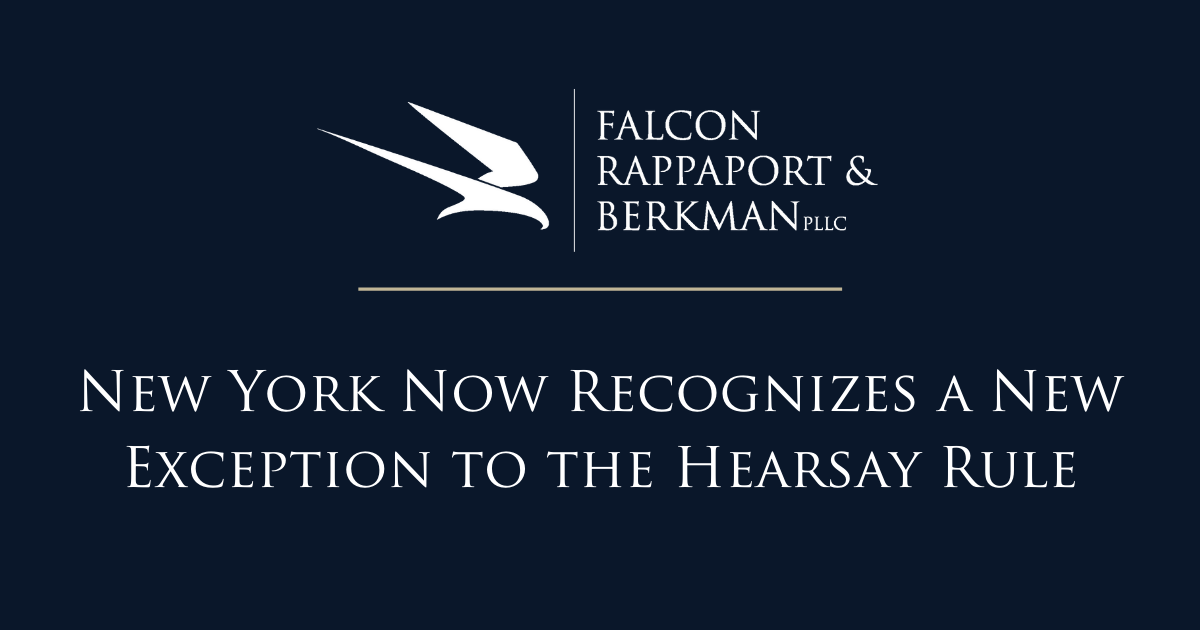New York Now Recognizes a New Exception to the Hearsay Rule
By: Jessica M. Moore, Esq. and Paul M. O'Brien, Esq.
Lawyers and non-lawyers alike are familiar with phrases such as “That’s Hearsay!”, universally understood to describe information received from another person. Typically, referring to information as “hearsay” carries a certain undertone – that the information relayed may not be adequately substantiated. Litigators are undoubtedly familiar with the rule against hearsay, which bars admission into evidence of an out-of-court statement made for the truth of the matter asserted. Like any rule, the prohibition against hearsay has its exceptions.
As of January 2022, New York will adopt a new provision to the Civil Practice Law and Rules, CPLR §4549 which states:
Admissibility of an opposing party's statement. A statement offered against an opposing party shall not be excluded from evidence as hearsay if made by a person whom the opposing party authorized to make a statement on the subject or by the opposing party's agent or employee on a matter within the scope of that relationship and during the existence of that relationship.
CPLR §4549 was drafted and signed into law in an effort to conform with the Federal Rules of Evidence. CPLR §4549’s federal law counterpart Federal Rule of Evidence 801(d)(2)(D) provides, if a statement is offered against an opposing party, and “was made by the party’s agent or employee on a matter within the scope of the relationship and while it existed,” is not hearsay.
The new hearsay exception does not apply to statements made outside the scope of an employment or agency relationship. This means that if an incident or accident occurred because the employee or agent was incorrectly performing their job, like a delivery driver driving off route, any statement made by that individual is still barred. Statements made by an employee or agent after they are terminated remain inadmissible because the statement was not made “during the existence of that relationship.”
Previously, the common law limited the admissibility of any agent’s statement (usually an employee) if the agent was not expressly authorized to make such a statement by the principal or employer. Thus, a statement such as “I am sorry I knocked you down, but I think you will be able to get up” made by an employee after an injuring the plaintiff, in the scope of employment would not be admissible in New York state court but would be admissible in a federal court. Schner v. Simpson, 146 N.Y.S.2d 369, 371 (1st Dep't 1955). Now, any statement made by an employee or agent within the scope of their employment or principal-agent relationship is admissible therefore allowing for a greater exchange of information and eliminating the employer’s shield.
Nevertheless, the new exception to the hearsay rule in New York will allow for more testimony from individuals with actual knowledge of events and will provide greater uniformity between the federal and state rules for the benefit of practitioners.
DISCLAIMER: This summary is not legal advice and does not create any attorney-client relationship. This summary does not provide a definitive legal opinion for any factual situation. Before the firm can provide legal advice or opinion to any person or entity, the specific facts at issue must be reviewed by the firm. Before an attorney-client relationship is formed, the firm must have a signed engagement letter with a client setting forth the Firm’s scope and terms of representation. The information contained herein is based upon the law at the time of publication.

